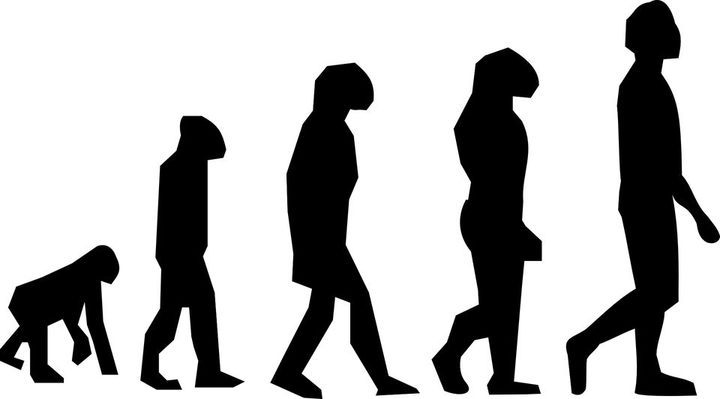Gaming Tribalism – Why do Players Divide and Fight?
The "console wars" have been around since the dawn of electronic entertainment. Just like the scuffleof Call of Duty and Battlefield fans. Why is that? The answer is simple – it's all because of evolution.

FROM THIS ARTICLE, YOU WILL LEARN (AMONG OTHER THINGS):
- Why people form groups.
- If xenophobia is human nature.
- What's the difference between logos of Xbox and PlayStation, and religious symbols.
- Why aggressive dictators are charismatic.
Prehistoric times
At the beginning of 2019, strange stone structures were found in the ethnographic museum in Wygielzow. Individual megalites had symbols engraved on their front — a cross colored with chlorophyll and umber symbols resembling the letters P and S deformed in three dimensions. Oddly enough, these symbols did not appear next to each other — the first type appeared on the western side, and the second type — on the eastern end of the village. The findings were dated about 100,000 years BC.
An expert of ancient history and art, who refused to give his real name because he is, well, a coward, stated that these are probably totems around which the tribes from the neighboring caves would come together. The tribes exterminated each other in a fratricidal fight. The scientist refused to comment any further, and when inquired about his name, he allegedly retorted: “Me? Galador, I should think.”*
This discovery is considered the first documented evidence of the console war between Xbox and PlayStation.
Don't recognize the quote? No wonder, it's from an obscure Polish adventure game, The Prince and the Coward.

Cultural-genetic coevolution, tribalism and other complex ideas
The above statements might have risen some eyebrows, but they’re scientifically accurate – more or less. The concept of cultural-genetic coevolution is equally perplexing, as it's difficult to prove. It assumes that social groups, along with their culture, are subject to similar laws of natural selection as the genome, and that this selection is as important as genetic selection. That individual instincts can be derived directly from cultural conditioning.
Cultural-genetic coevolution must not be confused with the theories according to which we're able to inherit the “genetic memory”; the knowledge acquired by our ancestors during their lives. According to the theory, social development affects genetics not because there's some magical stuff within your mitochondria, but rather because, ultimately, only some societies prevail. Some groups will inevitably meet extinction and their DNA will be wiped out, while others will survive, continuing their ancestral line.
This is rather easy to illustrate. If two tribes fought for hunting grounds, the success of one of the communities meant a supply of food, and thus the evolutionary success of its individual members – or at least a good shot at it. Hence, the genes that endured the longest, didn't belong to the best-adapted individuals, but rather the best-adapted group. By extension, it was more advantageous to support your own group than being a selfish jerk.

According to the concept of cultural-genetic co-evolution, the instincts can be divided into two groups: social, and tribal. Social (aka ancient instincts) allow people to maintain complex family relationships and build strong bonds of friendship. The tribal instincts, on the other hand, are much more interesting from the perspective of console wars, games, and "fan-boyism" in general, as they enable us to function in large groups of unrelated people.
Such instincts prove necessary for the cooperation of people united by some common cause, rather than genetic randomness. Thanks to these instincts, it was possible to build national structures and religious communities. Perhaps the development of tribal instincts was as instrumental for the homo sapiens' dominance in the natural world as were the opposing thumbs… or the belief that Half-Life 3 is still coming.
WHAT ARE TRIBAL INSTINCTS USED FOR?
First of all, they disambiguate the worldviews. Symbolically marked groups indicate who to learn from and who to follow — rationally assessing someone's behavior, especially if they are a more respected member of the community than us, is thus unnecessary.
These instincts also facilitate self-control. People usually prefer an immediate and certain reward than a time-deferred one, even if it's potentially better. This perception of the world is beneficial in the short term, but it may prove unavailing in the long run – especially if the entire “tribe” is considered. Therefore, social norms often promote postponing gratification. Ever heard the rule "work first, play later"? Education is constructed in much a similar way (at least in principle) — a person preparing for a profession is admitted to it only after acquiring the necessary skills, and not at the first lesson, when enthusiasm is probably the greatest. Breaking such standards oftentimes brings about a sense of shame, or even implicates tangible penalties. It's thus an immediate punishment. And when faced with a choice between postponed gratification and immediate punishment, we tend to opt for the former.
Social instincts impose cooperation. If we want to be members of the community, we need to adapt to its rules and participate in its endeavors. If we don't want to — well, there's always the voodoo death.

These instincts are highly desirable in the human population, because they allow the creation of larger, symbolically marked social groups, which, after all, constitute the building blocks of a developed civilization. So it's not surprising these seemingly primitive instincts pervaded in our minds throughout the evolution. Moreover, nowadays they seem to become amplified, gaining an increasing influence over our behavior. The fact that modern “tribes” are mostly united with common hobbies, work or lifestyle, does not change the way we engage in their affairs. On top of that, more traditional communities, united by origin, territory, or religion, have not become extinct at all.
Therefore even today, there will be people for whom the rationale of the "tribe" takes precedence over anything else – let's just mention the “My guild needs me!” meme. Such attitude fits the definition of tribalism in the common understanding, defining an instance where loyalty to the group is the highest value. The concept of neo-tribalism, proclaiming that man is not really created to live in mass society, and therefore spontaneously strives to establish smaller communities with strongly pronounced differences, can be considered an extension of this theory. This leads to the formation of subcultures, which, under specific conditions, further the isolationism.